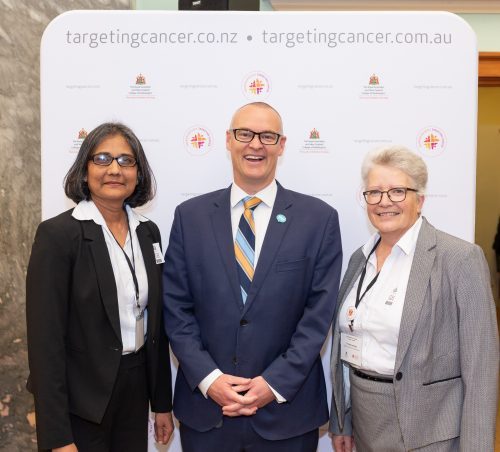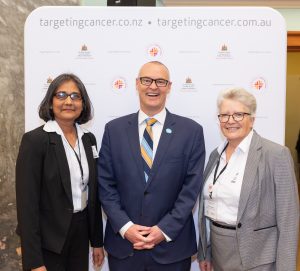New Zealand Horizon Summit puts radiation therapy on the forefront of parliament’s agenda


Improving access to potentially life-saving radiation therapy for thousands of New Zealand cancer patients was the key message delivered by the Royal Australian and New Zealand College of Radiologists (RANZCR) at the first-ever Radiation Oncology Horizon Summit, on 9 May at New Zealand’s Parliament.
Hosted by New Zealand Health Minister, the Hon Dr David Clark, the Summit brought together stakeholders from across government, industry, and consumer representatives to discuss improving access to radiation therapy. The event emphasised the current underutilisation of this lifesaving treatment and has kick-started the process of developing policy that ensures patients are always made aware of their choices when it comes to treatment and have access to radiation therapy when they need it.
RANZCR has been a driving force in advocating for cancer patients to have access to the most effective and appropriate treatment for their circumstances. The Summit was the first event of its kind in New Zealand and the turnout demonstrated that decision makers are taking the need for reform seriously.
Minister Clark highlighted the success of the Targeting Cancer campaign in increasing awareness of radiation therapy and improving access to the life-saving treatment for patients. “I want to congratulate the College on its work in improving public awareness about radiation oncology as a treatment option with your Radiation Oncology: Targeting Cancer campaign. It is important that people know about this treatment to improve access.”
As cases of cancer continue to grow in New Zealand, the Summit shed light on the importance of radiation therapy in helping to combat the disease. Today, cancer is the most common cause of death in New Zealand; responsible for nearly a third of all deaths, and is a leading cause of morbidity.
Minister Clark is fighting to overcome the shortfalls in cancer treatment and ensure New Zealand’s access to radiation therapy is in line with international best practice. “I’ve made my expectations very clear to the Ministry of Health that no patient with cancer should experience these delays in their treatment and I’ve sought urgent advice about how they can work with DHBs to improve the timeliness of radiation therapy.”
Speakers on the day included Chair of the New Zealand Radiation Oncology Executive Committee, Dr Carol Johnson, RANZCR Faculty of Radiation Oncology Dean, Dr Madhavi Chilkuri and the RANZCR CEO, Natalia Vukolova. Several other New Zealand radiation oncologists, expert in issues around the cost effectiveness of radiation therapy and challenges in patient access and securing an adequate radiation oncology workforce, also spoke.

(L-R) Dr Madhavi Chilkuri (Dean), Hon Dr David Clark (Minister of Health), Dr Carol Johnson (Chair, NZROE)
The Horizon Summit also offered an opportunity for patient advocate, Nola, to reflect on her experience of radiation therapy, and the lifesaving treatment she received. Nola is an early childhood education teacher who was diagnosed with oesophageal cancer. Nola speaks highly of the help she received and is very happy with her excellent outcome including normal swallowing after curative radiation therapy . “Six years ago, I was an oesophageal cancer patient with a poor prognosis. Now, thanks to radiation therapy and the amazing radiation oncologists that looked after me, I’m healthier than ever and I got the chance to chase my dream of becoming a primary school teacher.” You can view Nola’s story here.
The Summit was highly successful, with those in attendance formulating a number of key outcomes including a commitment to collaborate and consult on the National Cancer Plan, specifically the future location of facilities, and a recognition of the need to urgently implement and invest in a new funding structure. Strategies to identify and promote solutions to workforce shortage issues including trainee retention and awareness of radiation oncology professions were also prioritised. Working with medical schools to increase students’ awareness and understanding of a career in radiation oncology was one such solution highlighted at the Summit.



